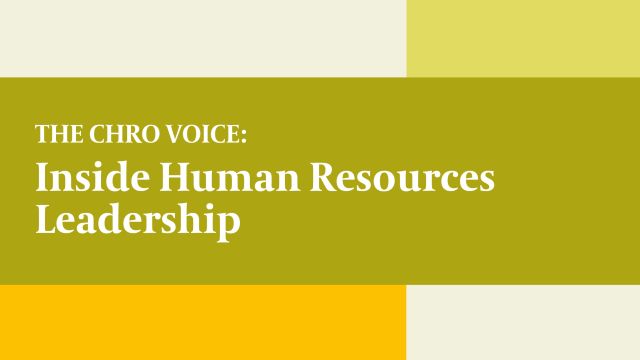When you are on the inside making a decision about a policy or employee, it becomes very, very grey, with multiple perspectives to consider. This complexity is where the HR role is particularly challenging and where HR expertise is the most valuable.
 Kate GeboUnited Airlines Executive VP of HR and Labor Relations
Kate GeboUnited Airlines Executive VP of HR and Labor Relations
Since working closely with HR leadership to navigate the worst impacts of the Covid-19 pandemic, companies are increasingly looking for CHROs who are not only people experts, but also capable of understanding and driving business strategy. To be successful in this evolving role, HR leaders need to increase their exposure to operations without losing sight of their unique expertise.
To explore this pivotal challenge and the broader evolution of the CHRO role, we spoke with United Airlines’ Executive VP of HR and Labor Relations Kate Gebo, who provided some crucial advice for the next generation of HR leadership as well as her own predictions for the future of the HR discipline.
The CHRO role is sometimes described as one of the loneliest positions in the C-Suite, second only to the CEO. Have you experienced this in your role?
There are times when it's the loneliest job. It feels loneliest when you can't discuss everything that is happening because you are the confidante of the leadership team. However, you’re also the person everyone wants to know. People are fascinated to hear about the company's dynamics, culture, strategy, and other related topics.
When I came into this role six or seven years ago, I didn't fully grasp how isolating it could be. However, it’s also incredibly rewarding when you see the organization progressing and understand that it's moving in the right direction due to the efforts of various players you've helped place in the right roles, encouraged, supported, or provided with hard feedback at critical moments.
How have you seen the CHRO role evolve over the past few years, particularly in the eyes of the CEO and other decision-makers within the C-Suite?
The pandemic had a major impact on what organizations want and need from HR leadership. Because of the implications of Covid-19 and what it meant for the economy and workforce, I think in many, if not all organizations, the CHRO is now being viewed much more as a strategic partner in terms of overall business strategy.
Events like the pandemic force businesses to change their culture and operations. Personally, I believe such events created opportunities for HR leaders to step up, highlight the importance of people and community within organizations, and be at the forefront of driving operational improvements.
Thinking about the next generation of leaders, what advice would you give to up-and-coming CHROs and HR leaders as they prepare for the future?
The first thing that comes to mind is spending time in the business. While it’s important to know your craft and really become an expert in HR, either as a generalist or within your specific vertical, I think with the path we’re currently on, taking the time to learn and navigate the business side of things is going to pay dividends.
The C-Suite and other decision-makers who are focused on business growth and performance speak a different language. Because they see things differently, the ability to look through their lens as an HR leader and partner will allow you to bring your unique perspective to difficult conversations and influence business strategy. This is why, whatever interests you in HR, making sure you spend some time in your career in the business is crucial.
While it’s important to know your craft and really become an expert in HR, either as a generalist or within your specific vertical, I think with the path we’re currently on, taking the time to learn and navigate the business side of things is going to pay dividends.
Kate GeboUnited Airlines Executive VP of HR and Labor Relations
Although the role appears to be moving toward business strategy, do you believe there will still be CHROs in the future who primarily focus on HR and have limited exposure to the business side?
I think that’s going to depend on what the CEO wants. Some CEOs will likely still want that subject-matter expert because they understand the importance of the HR component but aren’t very familiar with HR theory and language and how to translate that and integrate it into the business effectively. I believe there will be room for both types of CHROs.
HR expertise will always be important, which is why I’m sure you’ll find as businesses source for CHROs, some will want 100% HR-focused people. Sure, HR may use a different language in terms of the business, but that’s sometimes necessary when you’re dealing with complicated internal issues and trying to do so fairly and objectively. Without that expertise, a lot of these issues might appear black and white, and that can lead to false confidence about what the answer should be. But in reality, when you are on the inside making a decision about a policy or employee, it becomes very, very grey, with multiple perspectives to consider. This complexity is where the HR role is particularly challenging and where HR expertise is the most valuable.
What are you most excited about in the coming years, both in your role and for the future of HR more broadly?
The role of HR, and the overall people element of running a business, has really been growing in importance for companies, and this has given HR leaders a new platform to drive change. I also believe that the increased emphasis of technology is supporting this shift, and so I think the traditionally transactional work of HR departments, while still essential, is starting to give way to more strategic initiatives, and for me that is the most exciting part of my job.
I’m also going to be looking for companies that are growing and taking a more agile approach to HR. This is something that I think all companies need to be doing, because it’s clear that how we’ve done things for the last 10 or 20 years just isn’t going to be the way things are done in the next three to five. Being able to demonstrate that kind of agility and move with the needs of the business is going to be incredibly important.











